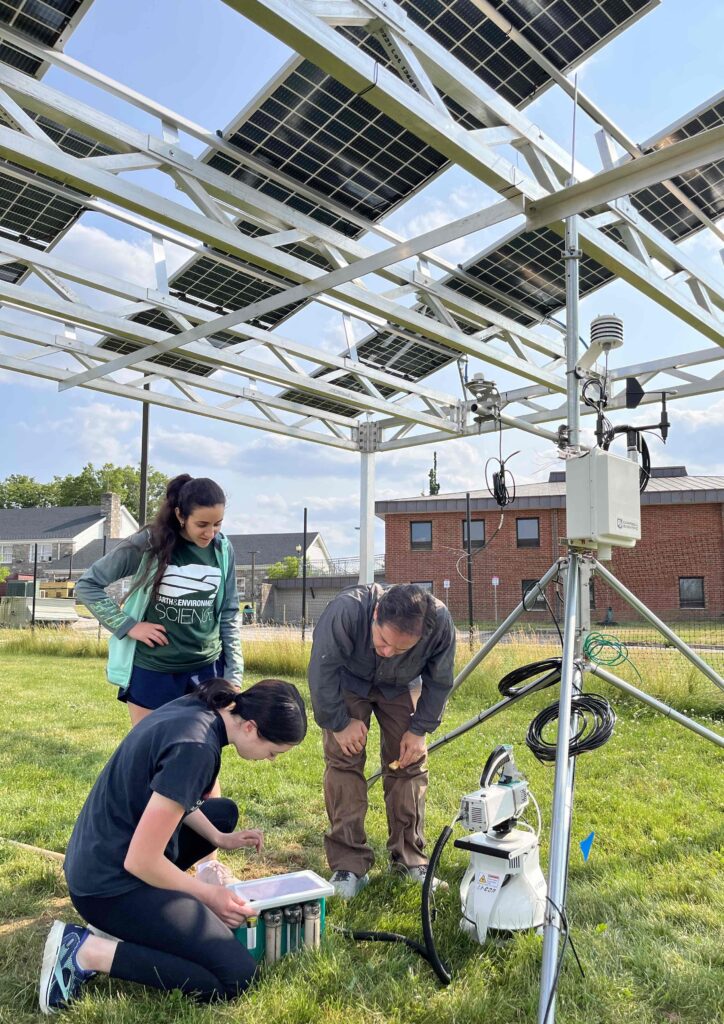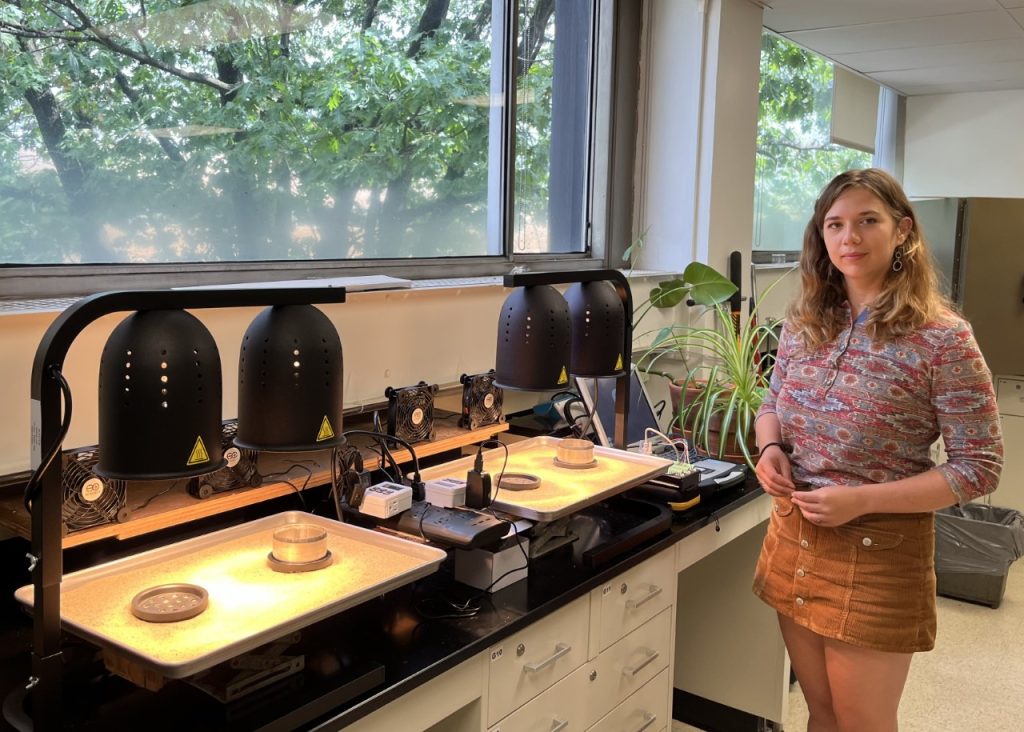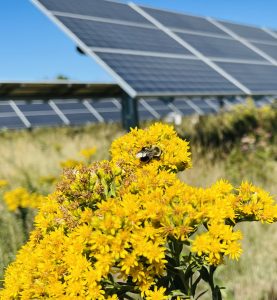EES students Caroline Merheb (PhD), Cara Rydzewski (ES major) studying the benefits and trade-offs of multi-functional solar projects in urban areas, that provide renewable energy while supporting food production. #NSF CAREER

EES students Caroline Merheb (PhD), Cara Rydzewski (ES major) studying the benefits and trade-offs of multi-functional solar projects in urban areas, that provide renewable energy while supporting food production. #NSF CAREER

This project will collect foundational field studies of micro-solar and agricultural colocation, specifically in the context of remote, off-grid locations, and developing countries.
Lucy Archibald, Geology major, received NSF GEO-REPS funding – to support up to one year of research training for students who did not have access to opportunities due to pandemic-related interruptions. Funding includes a competitive stipend (up to one year), research supplies and conference travel.

Lucy’s work focuses on how water is transported and retained in saline and sodic soils. Soil salinization is a major environmental issues with impacts on global food security and environmental quality. Saline soils present significant challenges to soil and water quality, soil biodiversity, soil erosion and economic crop production, creating significant challenges for more than 1.5 billion people around the world. Lucy will develop a novel experimental methodology to create soils with different salinity levels in the laboratory and will investigate and model water retention properties for agriculturally important soils in the US, which are prone to salinization. The GEO-REPS supplemental funding will enable her to continue this project for up to one year after graduation.
PhD position at Temple University
We have a graduate student opening (PhD) for studying sustainable engineering solutions to lower the environmental and economic cost of solar energy development by providing novel analysis methodologies and field data on solar energy – agriculture colocation approaches from multiple sites. The project will create research, educational and public outreach opportunities related to environmental sustainability by – training graduate students with novel tools and analysis, creating test sites for technology demonstrations of sustainable solutions, providing opportunities for public outreach, science communication and teaching (including international), and broadening participation of underrepresented groups.
The student will be advised by Sujith Ravi (Temple University, PA https://sites.temple.edu/ravi/home/). Learn more about our work on colocation of solar energy and agriculture: Ravi et al 2012, 2014, 2016, Choi et al, 2020, 2021, Bertel et al 2021, Towner et al 2021.
Master’s degree in geology, hydrology/water resources, civil or environmental engineering is preferred. The graduate student will be fully funded by research and/or teaching assistantships. Experience or interest in quantitative data analysis, sensor networks, science education/outreach activities is preferred.
Temple University is a comprehensive public research university located in Philadelphia, PA. Temple University is a dynamic urban university with around 40,000 students and provides one of the nation’s most comprehensive and diverse learning environments. Temple is classified as a university with the highest research activity (R1) and is ranked by the National Science Foundation as among the top 100 universities in the country for research expenditures. More information about our department is available at http://www.temple.edu/geology/ .
For more information contact Sujith Ravi, Associate Professor, Department of Earth & Environmental Sciences, Temple University, Philadelphia, PA (sravi@temple.edu).
Ravi et al. (2022) in Global Change Biology: Biological invasions and climate change amplify each other’s effects on dryland degradation.
https://onlinelibrary.wiley.com/doi/10.1111/gcb.15919
We made it to the cover !
Higher temperature regimes compounding the effects of frequent droughts is shifting the competitive advantage of plant functional groups, and is increasing the probability of vegetation “crash” states. Thus, two major drivers of global environmental change, biological invasions and climate change, can be expected to synergistically accelerate desertification. Thus, the two major drivers of global environmental change, biological invasion and climate change, can be expected to synergistically accelerate ecosystem degradation unless large-scale interventions are enacted.
Postdoctoral Opportunity in Renewable Energy & Environment
The Department of Earth and Environmental Science at Temple University (PA, USA) is seeking a full-time Postdoctoral Research Associate interested in the general area of environmental impacts of renewable energy development.
The successful applicant will investigate sustainable solutions to lower the environmental and economic cost of solar energy development by providing novel analysis methodologies and field data on solar energy – agriculture colocation approaches from multiple sites. The project will evaluate environmental impacts of solar energy development on soil and water resources and explore opportunities to colocate agriculture/range crops with solar infrastructure. This NSF-CAREER funded project will create research, educational and public outreach opportunities related to environmental sustainability by – training graduate and undergraduate students with novel tools and analysis, creating test sites for technology demonstrations of solar energy-agriculture colocation, providing opportunities for public outreach, science communication and teaching (including international), and broadening participation of underrepresented groups. Opportunities will also be provided for collaborating in other ongoing projects and for developing independent projects.
Learn more about our work on colocation of solar energy and agriculture: Ravi et al 2012, 2014, 2016, Choi et al, 2020, 2021, Bertel et al 2021, Towner et al 2021.
The postdoctoral scholar will be advised by Dr. Sujith Ravi (Temple University, PA https://sites.temple.edu/ravi/home/). The postdoctoral position is available immediately. Initial appointment will be for one year with likely renewal pending satisfactory performance. Requirements include a Ph.D. in earth sciences, hydrology/water resources, environmental science, environmental engineering or similar fields, strong organizational, communication and writing skills. Experience or interest in quantitative data analysis (using R or Python), sensor networks, science education/outreach activities is preferred. The successful candidate will be expected to contribute to proposal writing and mentoring undergraduate and graduate students.
Review of applications will begin immediately and continue until the position is filled. Interested candidates are encouraged to contact Dr. Sujith Ravi, Associate Professor, Department of Earth & Environmental Science, Temple University, Philadelphia, PA (sravi@temple.edu), with your current CV and sample publications.
Temple University is a comprehensive public research university located in Philadelphia, PA. Temple University is a dynamic urban university with around 40,000 students and provides one of the nation’s most comprehensive and diverse learning environments. Temple is classified as a university with the highest research activity (R1) and is ranked by the National Science Foundation as among the top 100 universities in the country for research expenditures. More information about our department is available at http://www.temple.edu/geology/ .
For more information contact Sujith Ravi, Associate Professor, Department of Earth & Environmental Sciences, Temple University, Philadelphia, PA (sravi@temple.edu).
We received funding from the National Science Foundation (NSF- Geomorphology & Land use dynamics) to study soil moisture dynamics and sediment transport in saline/sodic agricultural soils. We (with collaborators from UC Berkeley and USDA) will investigate fundamental soil hydrological and geomorphic processes involved in soil salinization and provide a new mechanistic framework for their explanation. Salinity-affected agricultural systems — a serious threat to global food security — are distributed throughout the world and a quantitative assessment of soil salinity-soil erosion nexus is therefore critically important in understanding feedbacks to climate, air quality, and soil degradation.
Sujith Ravi received a National Science Foundation (NSF) CAREER Award from the NSF/ENG/CBET Environmental Sustainability program. The Faculty Early Career Development (CAREER) is the US National Science Foundation’s most prestigious awards in support of early-career faculty who have the potential to serve as academic role models in research and education and to lead advances in the in their fields.
Berger, A., R. Valenca, Y. Miao, S. Ravi, and S. Mohanty (2019), Nitrate removal in biochar-augmented woodchip biofilters: Effect of rainfall extremes, Water Research, doi.org/10.1016/j.watres.2019.115008 [Elsevier, IF: 8.5]
Stormwater biofilters have been increasingly used to mitigate the impact of climate change on the export of contaminants including nitrate to water bodies. Yet, their performance is rarely tested under high-intensity rainfall events, which are predicted to occur more frequently under climate change scenarios. Overall, our results show that biochar could increase the resiliency of woodchip biofilters for denitrification in high-intensity rainfall events thereby mitigating the water quality degradation during climate change.
The goal of the visit was to formalize a long-term collaborative effort between the Department of Earth & Environmental Science at Temple University and Bogor Agricultural University (IPB) and Bandung Institute of Technology (ITB), two of Indonesia’s premier national agricultural and technological research universities.
You must be logged in to post a comment.